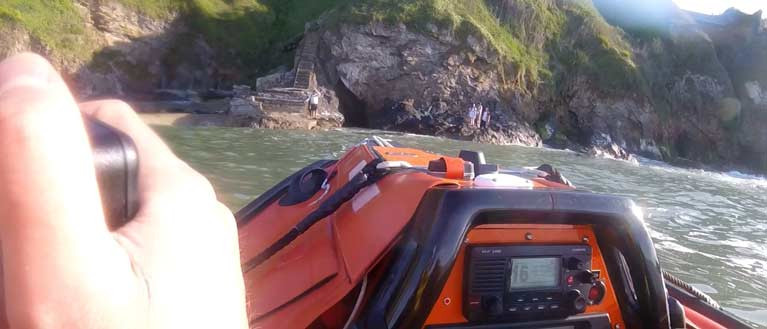Howth RNLI launched both the all weather lifeboat and the inshore lifeboat in 5 separate call-outs over the bank holiday weekend to rescue 12 people who found themselves in difficulty
The RNLI pagers sounded at 6.38pm on Sunday 31st May after a call was placed to the Coast Guard reporting 4 people stranded by the tide on rocks in Balscadden bay Howth. The inshore lifeboat was launched and located the 4 people 8 minutes later. They had become cut off by the tide and were quickly assessed and found to be in good spirits despite being in the water for a period of time. They were transferred back to the safety of Howth harbour.
The RNLI pagers sounded again on Monday 1st June at 4.04pm to reports of a speed boat that had mechanical problems and drifted onto Sutton strand. The inshore lifeboat was launched and quickly located the boat with 3 family members onboard.

The speedboat was taken in tow by the crew of the inshore lifeboat and the family were unharmed by the incident and returned safely to shore at Howth Lifeboat Station.
The RNLI pages again sounded just over an hour later at 5.50pm to reports of 5 people stranded by the tide in the centre of Baldoyle estuary. The coast guard helicopter Rescue 116 was also tasked to the scene and airlifted 1 of the party of 5 people while a local paddle boarder was assisting in returning 3 people to shore as the final person swam to shore. Howth RNLI inshore lifeboat assessed the casualties on the beach.

Rescue 116 landed on Portmarnock strand and passed the casualty to the RNLI inshore lifeboat who returned them safely to their friends.
The RNLI had launched earlier in the weekend on 2 further occasions to false alarms with good intent.
Speaking following the callout, Noel Davidson, Howth RNLI Volunteer Press Officer said: ‘Our volunteer lifeboat crew are always ready to respond to a call for help and have launched 13 times in the last 20 days. Thankfully while some of the call outs proved to be false alarms with good intent, this bank holiday the RNLI were able to rescue 12 people from separate call outs and all were brought to safety from situations that could have been quite serious’
‘Always check the tide times and conditions before you set off and while out, be aware of your surroundings and keep an eye on the tide direction. Ask for local advice and look out for safety signs. Always carry a means of calling for help and know to call 112/999 and ask for the Coastguard if you or someone else is at risk.’
The RNLI continues to provide an on call 24/7 search and rescue lifeboat service. To ensure peoples’ own safety in or on the water please adhere to the relevant water safety guidance for your activity. More information can be found at www.rnli.org/safety































































